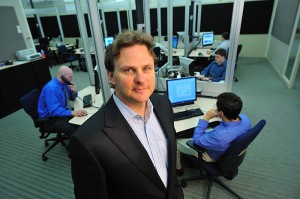
Before coming to UConn, Christopher Levesque was president and CEO of Affinimark Technologies, a start-up he put together and turned into a solid biotech firm. It wasn’t his first adventure into entrepreneurship.
Eric Knight, a 1982 UConn graduate, has started more than a dozen companies, most recently Up Aerospace, the only non-governmental company in the world, he says, “that puts things into space.” Recent launches included sending the ashes of James Doohan, who played Scotty – the engineer who ran the Starship Enterprise on StarTrek – several miles into space, something Doohan’s wife said he always wanted.
Now Levesque is director of the Connecticut Center for Entrepreneurship and Innovation (CCEI) in UConn’s School of Business, and Knight, a career entrepreneur who “likes building and making things, not running things,” is pitching in, helping student entrepreneurs explore their ideas and serving as a judge on various business school competitions.
“We know the how to’s – intellect combined with wisdom. Many of the most brilliant inventions never see the light of day because of the hurdles involved,” Levesque says. “The CCEI is dedicated to helping the state’s entrepreneurs get over those hurdles.
“We’re going to blow the doors off this place,” adds Levesque, whose enthusiasm can barely be contained in one room. “We’re a UConn center with a statewide charter – an economic enterprise – charged with stimulating entrepreneurship and innovation throughout the state.”
Working out of the School of Business’ Innovation Accelerator, located in the Connecticut Center for Advanced Technology Building in East Hartford, the CCEI staff builds three or four teams of students each semester, each with a faculty advisor, to work with people who have an existing business or a business idea, and help them prepare their idea for the commercial market. Their biggest success so far has been the social networking site Shizzlr, which has grown from two employees – its founders, both UConn graduates – to those two plus 10 employees. Another success was Go Motion, a company that created an all-terrain wheelchair.
A Working Partnership
More recently, one member of an Innovation Accelerator (IA) student team who worked with the CEO of Arcanatura – a natural product animal health company that uses social media marketing to reach its customers – was recently hired by the early stage business. Additionally, the final report prepared for Arcanatura by the IA Student Team was a pivotal document that helped persuade an angel investor group to invest in the start-up company.
“CCEI is a great partner to the University’s Technology Incubation Program and an asset to state economic development interests,” says Rita Zangari, executive director of UConn’s Technology Incubation Program (TIP). “CCEI has provided a variety of our TIP companies with support through their faculty/student teams that will certainly enhance their prospects. In one case the CCEI team redefined the market opportunities for a clean energy company, and in another the team developed a plan for use of social media to market its products and satisfy the interests of outside investors. Both were very pleased with the results.”
The CCEI supports business development by assisting new and existing companies in solving complex business problems such as globalization strategies, market analysis, financing and intellectual property challenges. It also works with businesses in the TIP, and brings students and faculty to the table to work with companies looking for a variety of answers or a way around a stumbling block. And it runs an annual business competition among students which in April caught the interest of 76 student teams, compared to eight last year.
“I expected maybe 35 or 40 when I opened it up to the entire University, not just the business school,” says Levesque. “That would have been a wild success. But 76? My thinking in expanding the competition was to see how strong the spirit of entrepreneurship was here, and it was big.”
Exceeding Expectations
Levesque also surpassed the expectations of business school dean Christopher Earley.
“Chris has been an outstanding addition to the UConn School of Business,” Earley says. His leadership at CCEI has helped increase the visibility of the center across the state and region. With new business competition programs, enhanced links to our Office of Technology Commercialization, and new efforts to reach out to Yale and other universities in Connecticut and beyond, Chris and CCEI have surpassed our most ambitious expectations.”
Levesque’s outreach has also included state legislative leaders, state agencies, the Connecticut Technology Council, the Connecticut Venture Group, and others. And aside from guiding student teams during the summer and academic year, he also has developed an undergraduate course based on the experiential learning model used at the Innovation Accelerator, where he is wrapping their work with companies around a three-credit curriculum. Thirty-five students signed up for the course last semester, working with seven client companies.
Levesque also plans to develop a forum on entrepreneurship, using resources from the schools of business and engineering, in Farmington and involving the UConn Health Center with a focus on entrepreneurship and innovation in the bio-medical technology field.
He also plans to reach out to UConn’s regional campuses, especially Stamford and Avery Point, in future semesters, hopefully starting this fall.
Through it all, Knight, the serial entrepreneur, is ready to lend a hand, as a mentor or judge.
“It’s really hard to turn down an opportunity to work with these inspired students,” he says. “This is a shining example of what I wish we had had at UConn when I was a student. Helping the students and the companies is fulfilling a passion of mine.”
Now it is here, and Levesque wants it and the companies they help to stay here.
“Connecticut is one of the largest developers of intellectual property in the nation, but it doesn’t always stay here,” says Levesque. “Well we want to keep it here, and I’m going to do my best to make that happen.”


